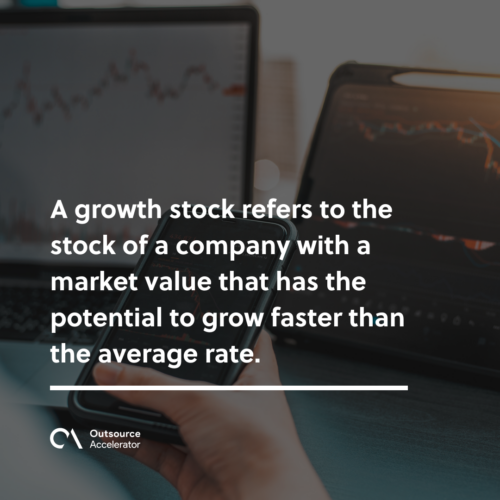Growth stock
Definition
What is a growth stock?
A growth stock refers to the stock of a company with a market value that has the potential to grow faster than the average rate.
Companies considered to be a “growth stock” have growth characteristics such as – success in research and development, good marketing programs, and excellent management. These are usually smaller or startup companies, especially in the growth sectors like technology and biotech.
These companies generally don’t pay dividends mainly because they suffer negative cash flows that are usually tied to the higher growth rate.
An example of a successful growth stock in the global market includes Amazon, Meta, Apple, Netflix, and more.
Amazon Inc. is one of the largest growth stocks today globally. As of June 2022, Amazon ranks fifth among US stocks in terms of its market capitalization. The company’s stock has been traded at a high price-to-earnings (P/E) ratio. And for the year 2022, its earnings per share (EPS) growth estimates are over 67.

Investing in growth stock
Investors seeking a massive return on their investments tend to purchase a growth stock with the expectation of share price appreciation.
However, it is also considered a high-risk investment and can be relatively volatile. Since growth stocks typically do not pay dividends, investors can only earn money when they sell their shares.
It may appear to be an attractive investment option, but its level of uncertainty can be very risky. If the business is not in good condition, investors may take a loss on the stock when trading.
On the other hand, growth stock also offers a lot of advantages to investors. They can accumulate earnings through capital gains as they sell their shares in the future. And these capital gains are subject to long-term capital gain tax (LTCG).
In growth stock, the profits are realized over a long period of time. Additionally, the returns on stocks are bigger than the inflation rate, which is an opportunity for investors to generate income in their total investments.
There are several factors to be considered before investing in a growth company, which include profitability, balance sheet health, emerging trends, and analyst predictions.

Growth stock vs value stock
In growth stock, investors expect to earn capital gains in companies that have a steady growth. However, these stocks tend to be overvalued due to their high price-to-earnings (P/E) ratios.
On the other hand, value stocks are often undervalued and ignored by the market. These are the stocks typically at low prices but have the potential to gain value over time. Value stocks are most likely to be traded at a low price-to-earnings (P/E) ratio.
Some investors include both growth stocks and value stocks in their portfolios for diversification.







 Independent
Independent




